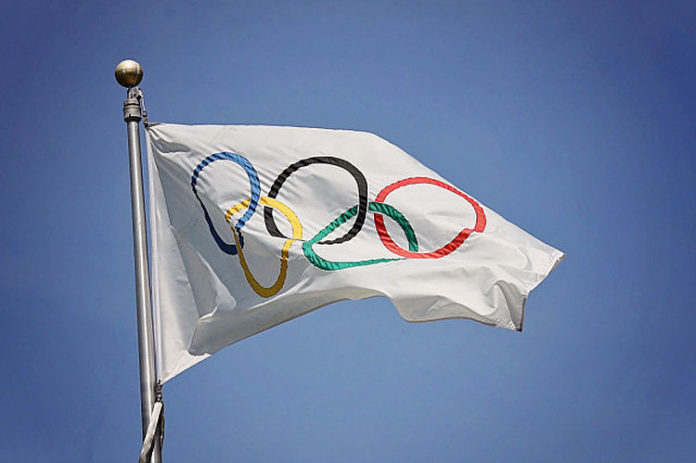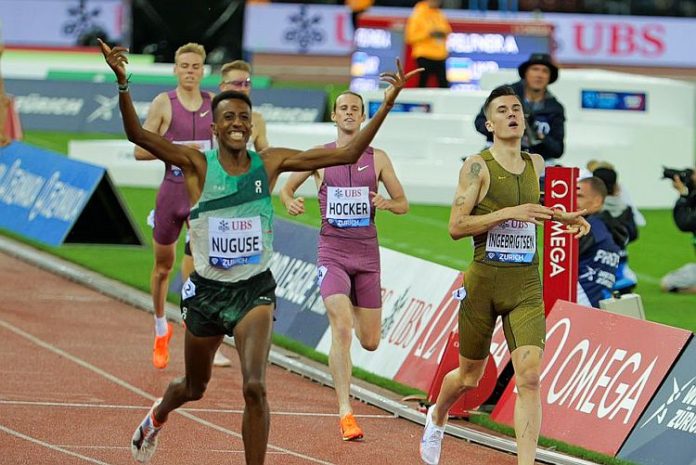★ The Sports Examiner: Chronicling the key competitive, economic and political forces shaping elite sport and the Olympic Movement.★
★ To get the daily Sports Examiner Recap by e-mail: sign up here! ★
≡ ANALYSIS & OBSERVATION ≡
On Thursday, the World Anti-Doping Agency released the 59-page report of former Vaud attorney general Eric Cottier into questions of WADA’s actions – or lack of action – after being informed that 23 Chinese swimmers had tested positive for trimetazidine at a meet in January 2021.
A ferocious war of words has gone back and forth between news media reports, especially an April 2024 broadcast of “The China Files” by the German ARD channel, and the U.S. Anti-Doping Agency and WADA over the handling of these 2021 positives. But there are other issues.
Cottier was asked by WADA to answer only two questions: (1) did WADA show bias toward China in its handling of the situation and (2) was WADA’s decision not to appeal the Chinese finding of “no fault” a reasonable one.
Cottier answered yes to both questions, but his report went much, much further. Perhaps the key conclusions of the report came on page 39. This is pretty dense reading, but important:
● “[T]he Investigator notes that the procedural rules recalled by the [consulting expert] and rightly described as fundamental, were neither respected nor applied by CHINADA [Chinese Anti-Doping Agency] when it learned of the 28 AAFs [adverse analytical findings]. This can be summed up in two sentences.
● “Firstly, the national agency decided from the outset not to deduce from the AAFs the presumptions laid down by the regulations, thus reversing the roles of burden of proof in the investigation to be carried out.
● “Secondly, this option spared swimmers the consequences provided for by the regulations: Notification, hearing, suspension (in principle compulsory), withdrawal of results, loss of bonuses, etc.
● “Moreover, the Agency [WADA] does not dispute CHINADA’s failure to comply with the applicable rules … Nor can it be disputed that CHINADA’s choices ‘benefited’ the athletes, both in terms of their status in the procedure and in terms of their lives and activities as athletes, at least temporarily, in relation to strict compliance with the procedure.
● “While admitting that CHINADA’s modus operandi did not comply with the rules of procedure, to the best of the Investigator’s knowledge, WADA has never formally and publicly challenged it.
● “In any case, it did not do so before deciding not to lodge an appeal. Nor does it appear to have done so subsequently. Even in their recent determinations, while admitting that the rules were not respected, it relativizes the fact, particularly by placing it in the complicated period of time, i.e. the pandemic and its consequences in terms of complications for athletes in exercising their rights and their personal involvement in the acts of investigation, their difficulty in accessing means of proof.”
In a nutshell, that’s what happened. But Cottier give plenty of specifics, all of which contributed to exonerating the swimmers and placing WADA in a completely impossible situation in which it was powerless to achieve any kind of satisfactory result.
Let’s start with the timetable of the case:
● 03 Jan. 2021: The Chinese national swimming championships were held in Shijiazhuang City, in the Hebei province, city of 11 million people southwest of Beijing. Some 39 swimmers were tested.
● 14 Jan. 2021: The test samples were transferred to the Beijing doping laboratory on 14 January. Before then, a new Covid-19 wave had appeared, causing the Zhengding Huayang Holiday hotel in which the swimmers stayed, to be closed until the end of February.
● 15 Mar. 2021: Because of the new Covid infections, the Beijing lab froze the samples and did not report the test results until 15 March, 72 days after the samples were collected.
● 16 Mar. 2021: WADA was notified by CHINADA of the positives, but took no action.
● 07 Apr. 2021: CHINADA followed up with a letter detailing its investigation of the positives, which was ongoing. No reaction from WADA.
● 31 May 2021: CHINADA’s draft decision was send to WADA, with comments and suggestions welcomed. No reply was made by WADA.
● 08 Jun. 2021: CHINADA sent its completed decision to WADA.
End of case, and the swimmers received no sanctions as CHINADA concluded that the positives came from environmental contamination, in specific, in the food they were served at the hotel.
The positives showed low amounts of trimetazidine and most of the athletes who tested positive had been tested both before and after the nationals meet and returned negative findings.
The Cottier report then went into questions of the pharmacological aspects of the case and the legal procedures used:
● As to the science of trimetazidine and doping, Cottier involved experts in the field and found:
(1) “[T]he time elapsed between doping control (1-3 January 2024) and the announcement of the case to WADA and FINA (16 March 2021), i.e. more than 70 days, did not appear to comply with the applicable standards.”
In fact, the famous case of Russian figure skater Kamila Valieva concerning the 2022 Olympic Winter Games in Beijing involved a doping positive on 25 December 2021 that was not reported – due to delays relayed to Covid – until 7 February 2022, 44 days later. In the case of the swimmers, it was 72 days later.
(2) As to the possibility of contamination, Cottier referred to the question to an outside expert, who was not identified, who reported:
“[O]n the basis of these pharmacokinetic data alone, it is not possible to rule out intentional (or unintentional) intake of TMZ for doping or therapeutic purposes in the weeks leading up to the competition.
“Environmental contamination with low doses of TMZ during the hotel stay is also possible and can neither be ruled out nor affirmed with certainty on the basis of scientific data, but I see no scientific argument of a pharmacokinetic nature in favor of one hypothesis over another.”
In other words, the expert could not tell one way or the other, and later cited circumstantial factors in favor of contamination, notably that so many swimmers produced doping positives at one time.
● As to the way the case was handled by CHINADA, the responses were more stern. Cottier engaged the law firm of CMS von Erlach Partners SA, whose replies included:
“In short, the Chinese Anti-Doping Organization, by refraining from notifying the positive athletes, completely ignored [International Standards for Results Management] Article 5.1.2.1, which the expert describes as a fundamental violation of anti-doping rules. This violation gave rise to a whole series of consequences which, in the expert’s view, are the results of many flaws in the proceedings conducted by CHINADA.
“In his conclusion on question 2, the expert basically replied that CHINADA’s handling of the case had deviated significantly and fundamentally from the procedures laid down in anti-doping standards, that these deviations were particularly serious given that they had enabled the athletes concerned – in the absence of an appeal by WADA – to benefit from an absence of an [anti-doping rules violation] (as well as an absence of any consequences), outside the application of the specific circumstances likely to call into question an [adverse analytical finding], notably a negative “B” sample analysis or a causal deviation in the [International Standard for Testing and Investigations] or [International Standard for Laboratories].
“Referring to his earlier comments, the expert replied that CHINADA had not complied with the applicable procedure by failing to give notice within the meaning of ISRM Article 5, the result was that it did not issue a provisional suspension, which was mandatory at the time.
“The expert considered that the fact that CHINADA was carrying out an investigation in parallel did not change anything, given that this investigation did not concern elements likely to justify a lack of notification.
“CHINADA should therefore have imposed a provisional suspension (mandatory) on the athletes concerned by the [adverse analytical findings]. CHINADA would have retained the possibility of lifting the suspension during the course of the proceedings, depending on the outcome of the investigation and/or the athletes’ determinations.”
So, what about WADA? Cottier’s report makes some points clear:
(1) As for CHINADA’s finding of no fault, clearly against the rules contained in the World Anti-Doping Code, Cottier writes of WADA:
“In retrospect at least, the Agency’s silence is curious, in the face of a procedure that does not respect the fundamental rules, and its lack of reaction is surprising.”
(2) Cottier wrote of CHINADA’s 7 April letter and WADA’s non-reaction:
● “The content of the 7 April 2021 notice clearly left no doubt that CHINADA was managing the results and conducting its investigation in deviation from the fundamental rules and principles of procedure, not only by conducting a very thorough investigation, but also, while the AAFs led to a presumption of ADRVs, and this presumption was not overturned by any of the circumstances allowing it, by not initiating formal proceedings against the swimmers.”
● “Legally, the Investigator can follow the very short explanation from the Agency, in the sense that, formally, there was no rule requiring it to act. On the other hand, given the role of WADA, the frontline guardian of the fight against doping worldwide, this simple reference to the absence of a rule imposing action is not satisfactory. At the very least, the extraordinary nature of the case (23 swimmers, including top-class athletes, 28 positive tests out of 60 for a banned substance of therapeutic origin, etc.), could have led to coordinated and concerted reflection within the Agency, culminating in a formal and clearly expressed decision to take no action.”
(3) He pointed out that this lack of action was, apparently, standard procedure:
“It should also be remembered that in the cases of group contamination on which the Investigator asked WADA for information, there was, with one exception, never any notification, suspension or hearing. This means that the procedure, with its presumptions, reversals, burden of proof, etc., has apparently not been respected by the anti-doping organizations and/or federations concerned. WADA has not reacted to these cases, even if only by reminding them of the formal rules.”
(4) WADA looked past all the procedural irregularities, knew it could not produce a compelling case of intentional doping in an arbitration hearing and, in view of the pandemic and an impending Olympic Games in Tokyo, let it go:
“The Investigator cannot imagine that the procedural non-compliance of CHINADA’s actions would have escaped the attention of the experienced legal experts who deal with doping on a daily basis, whether at WADA or its lawyers. The reality is that the Agency considered, in casu, that it was the final result and its concrete consequences that mattered.”
Cottier noted in the report that “further investigations would not be able to change the assessment of the case” for WADA and that WADA “pointed out that they had not appealed, as they were unable to contest the food/environmental contamination scenario.”
(5) And Cottier noted that any WADA on-site inquiry at the hotel where the contamination was to have taken place would have been useless even a week after the tests, since the hotel closed due to Covid and was thoroughly cleaned and disinfected:
“In view of the documents in the Chinese file and the answers given between June and July 2021 to WADA’s questions, the possibility of obtaining further details seems illusory. The vagueness that remains is regrettable. It suggests practices that are questionable from a hygiene point of view.
“That said, total and absolute disinfection when the hotel closed, or when it reopened, with a view to eliminating any risk linked to the COVID-19 virus, would not have been more useful to the investigation operations. On the contrary, it would have entailed the risk of obliterating many, if not all, traces.”
Moreover, Cottier wrote that the pharmacokinetic evidence indicated that the use of trimetazidine in “clinically effective and potentially doping doses” was ruled out.
Observed: Cottier wrote compellingly about the issues of procedure and trust which are raised by this case late in the report, stating:
“[T]he Investigator is aware that 23 athletes were ultimately granted a kind of ‘no contest,’ which the body in charge of the worldwide fight against doping did not contest even though, according to the letter of the applicable provisions, introduced to strengthen the worldwide fight against doping, the positive results of their tests created a presumption of guilt on their part, based on the principle of strict liability, which they did not have to rebut because of the failure to apply the rules on the burden of proof.
“Given the ratio legis of the system established by the Code and the various rules for its
application, this may come as a shock. It may even create a feeling of injustice among
competitors opposed to the athletes in question in one or other discipline.
“The sense of justice or injustice, however, goes far beyond the scope of this investigation.”
But that is the situation that WADA finds itself in, and Cottier said so:
“WADA’s apparent silence is hardly compatible with its role as worldwide guardian of compliance with procedures.”
That WADA was placed in an impossible situation, with a mass of positives from a single meet in a country locking down due to Covid, and with an Olympic Games just weeks away that would prevent any arbitrator from disqualifying athletes absent rock-solid proof of doping, is clear. How it reacted is now the issue.
Based on the Cottier report, WADA should clearly have issued a public notice about the positives when it was notified in 2021. And it should have required CHINADA to enforce the rules in place on sanctions and appeals.
Moreover, the Cottier report indicates that based on what he called unimpeded access to all of the files in the case, they should have been made available to the anti-doping community – such as U.S. Anti-Doping Agency head Travis Tygart – to answer all the questions.
Transparency might have been the best play here. The Cottier report does not say WADA did nothing wrong. It says only that it did not show favoritism to the Chinese athletes – WADA simply concluded it would be defeated in any arbitration hearing – and was not unreasonable in not appealing a case it knew it had no chance of winning.
That’s not much of a victory. But maybe changes will come from it.
Rich Perelman
Editor
★ Receive our exclusive, weekday TSX Recap by e-mail by clicking here.
★ Sign up a friend to receive the TSX Recap by clicking here.
★ Please consider a donation here to keep this site going.
For our updated, 547-event International Sports Calendar for the rest of 2024 and beyond, by date and by sport, click here!

























